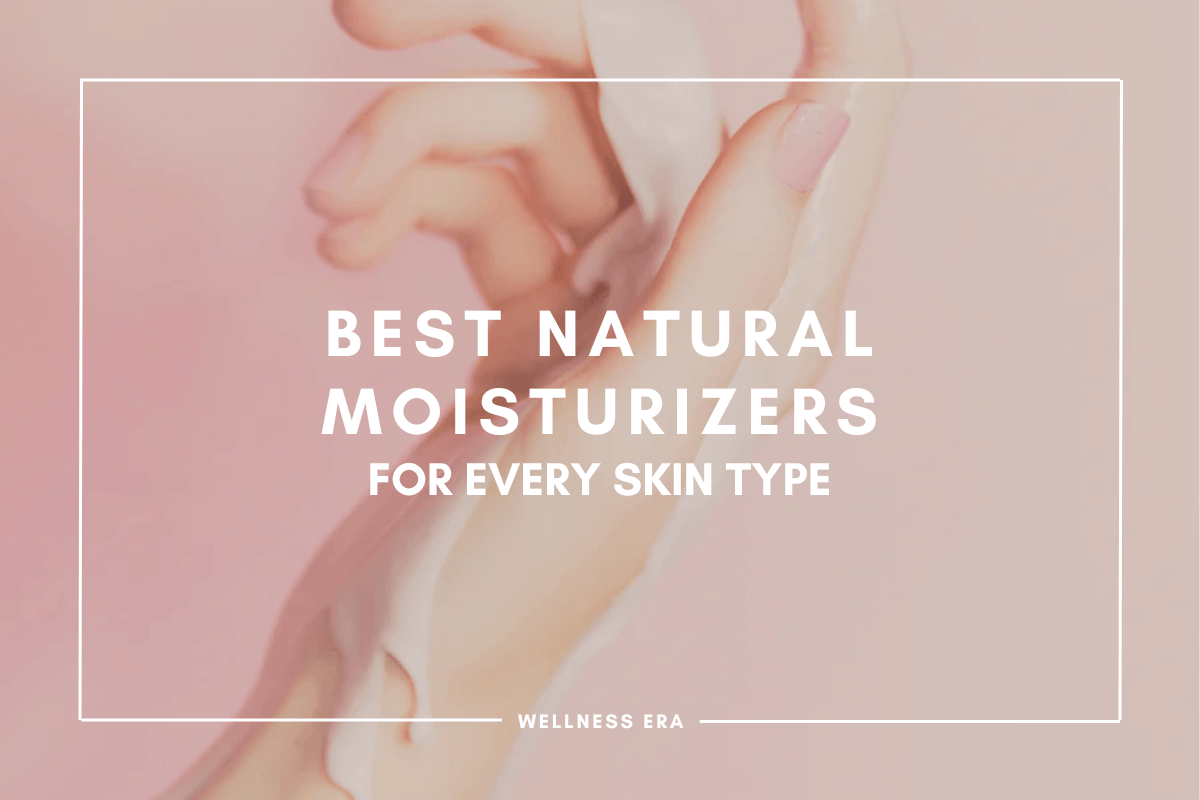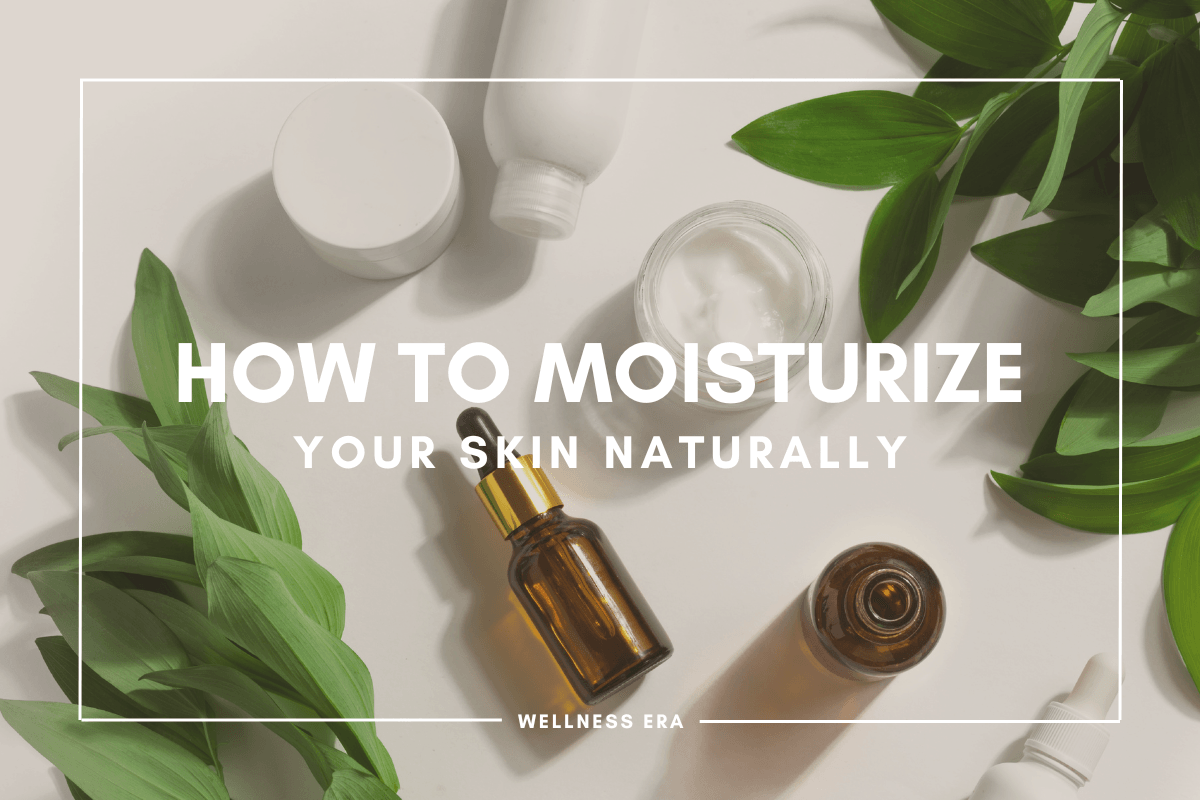What’s the Importance of Cleansing in Natural Skin Care?
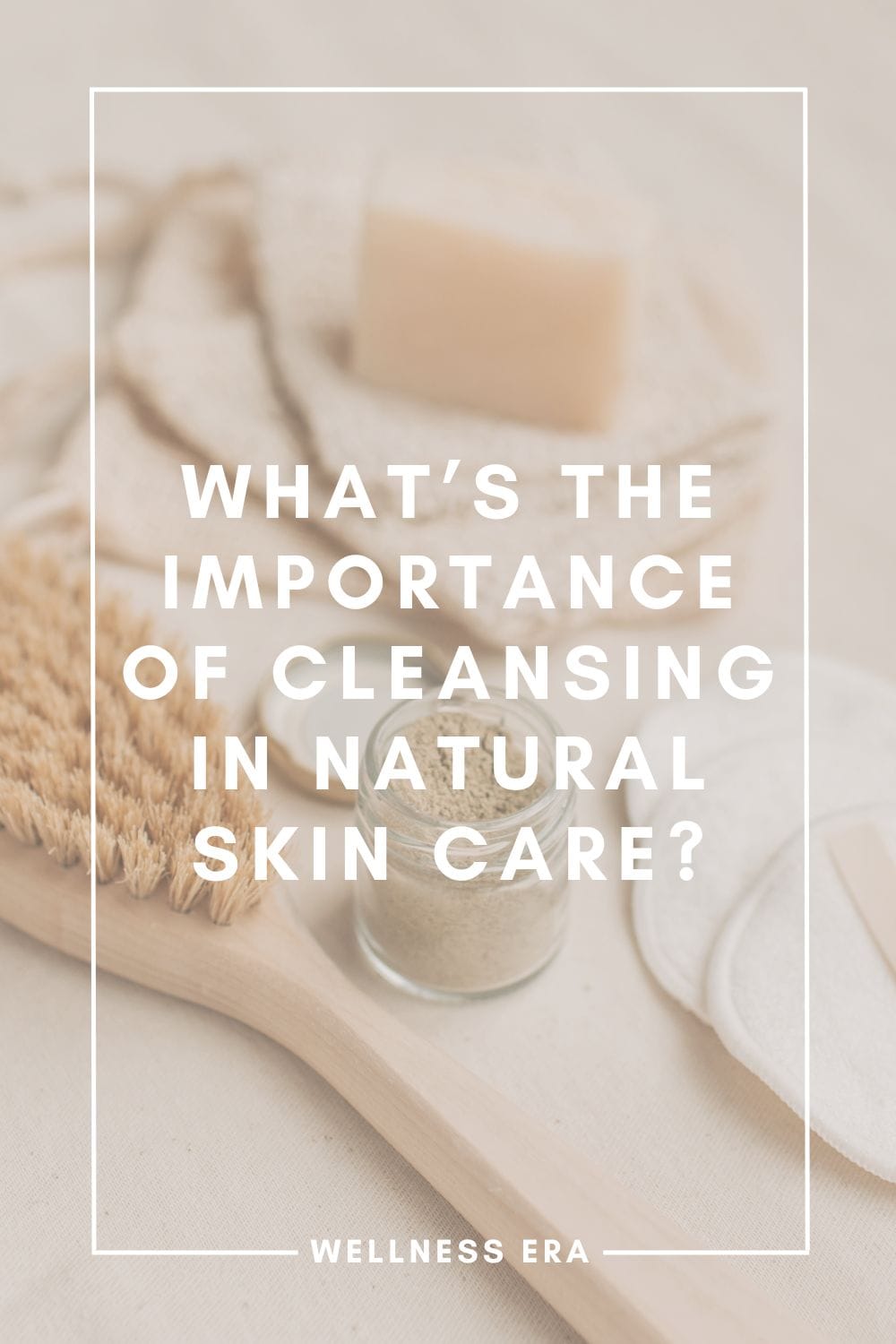
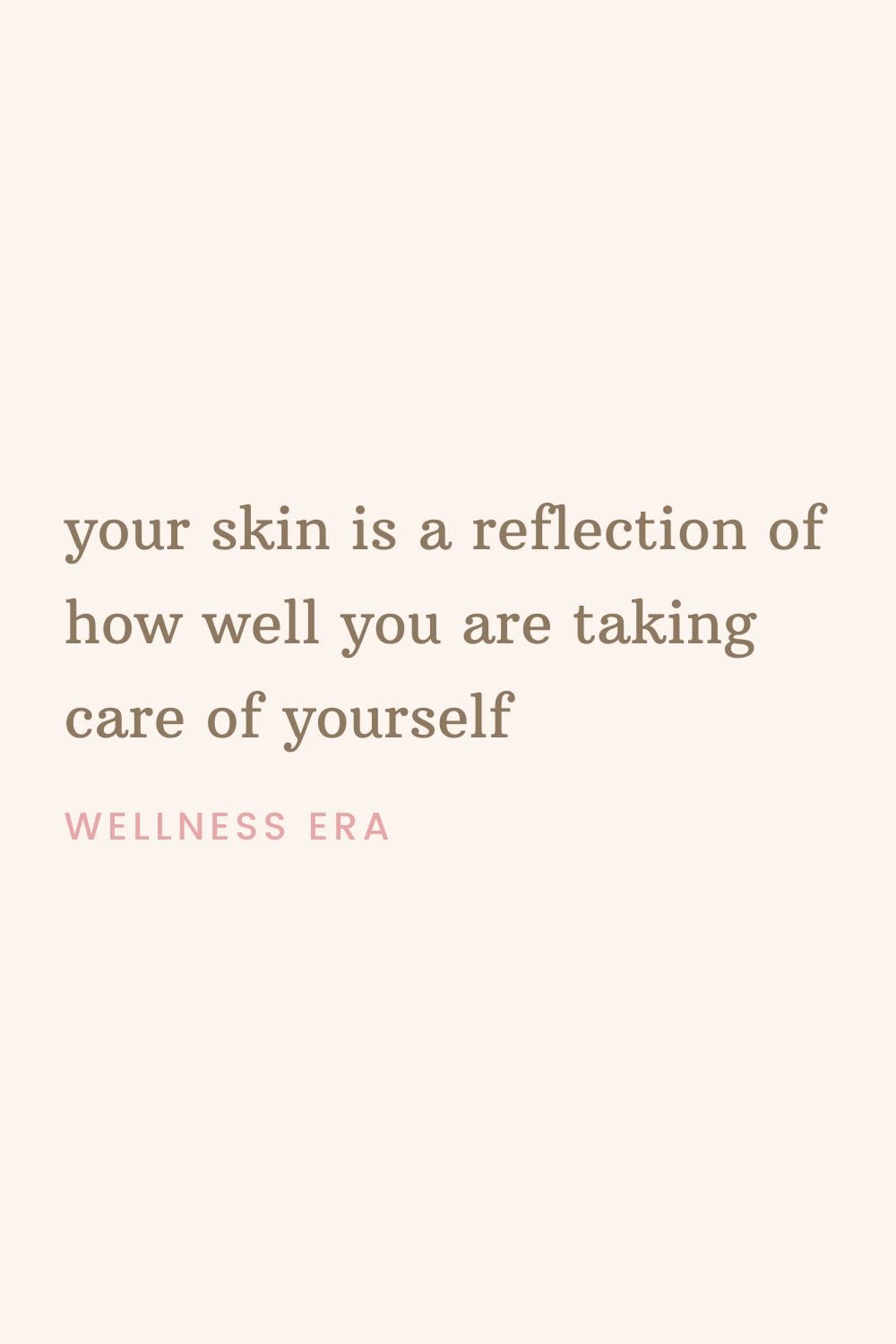
In the world of natural skincare, cleansing plays a vital role in achieving and maintaining healthy, radiant skin. More than just a simple step, cleansing removes impurities, maintains the skin’s natural balance, and allows it to absorb nutrients from other skincare products effectively. For many individuals, especially those mindful of chemicals and toxins, choosing natural ingredients for cleansing is increasingly popular. Natural cleansers not only avoid potentially harmful ingredients but can also nourish the skin in ways that chemical-based products often cannot.
This blog post delves into the importance of cleansing as a fundamental aspect of skincare, the types of impurities we encounter daily, and the advantages of using natural cleansers. By understanding the role of natural cleansing and how to select the best ingredients, individuals can make informed choices that support both their skin health and overall well-being.
1. Why Cleansing Is Essential for Healthy Skin
Regular cleansing is crucial for maintaining skin health, as it removes various impurities that accumulate throughout the day, including sweat, oils, and environmental pollutants. Without proper cleansing, these impurities can clog pores, leading to issues such as acne, dullness, and irritation (Mukhopadhyay, 2011). Cleansing also enhances the skin's ability to absorb nutrients from moisturizers, serums, and other treatments applied afterward, improving their effectiveness (Westlake Dermatology, 2013). This step is particularly important for individuals using natural skincare products, as a clean skin surface allows these natural nutrients to penetrate more effectively.
The effects of not cleansing regularly extend beyond clogged pores. Neglecting this routine can disrupt the skin's natural moisture balance, potentially leading to dryness or an overproduction of oil as the skin tries to compensate (Eden Medical Clinic, 2022). Additionally, inadequate cleansing has been linked to an increased presence of harmful bacteria, which may contribute to inflammatory skin conditions such as acne and dermatitis (Mukhopadhyay, 2011). For anyone committed to a natural skincare regimen, regular cleansing with gentle ingredients is fundamental to achieving clear, balanced, and healthy skin.

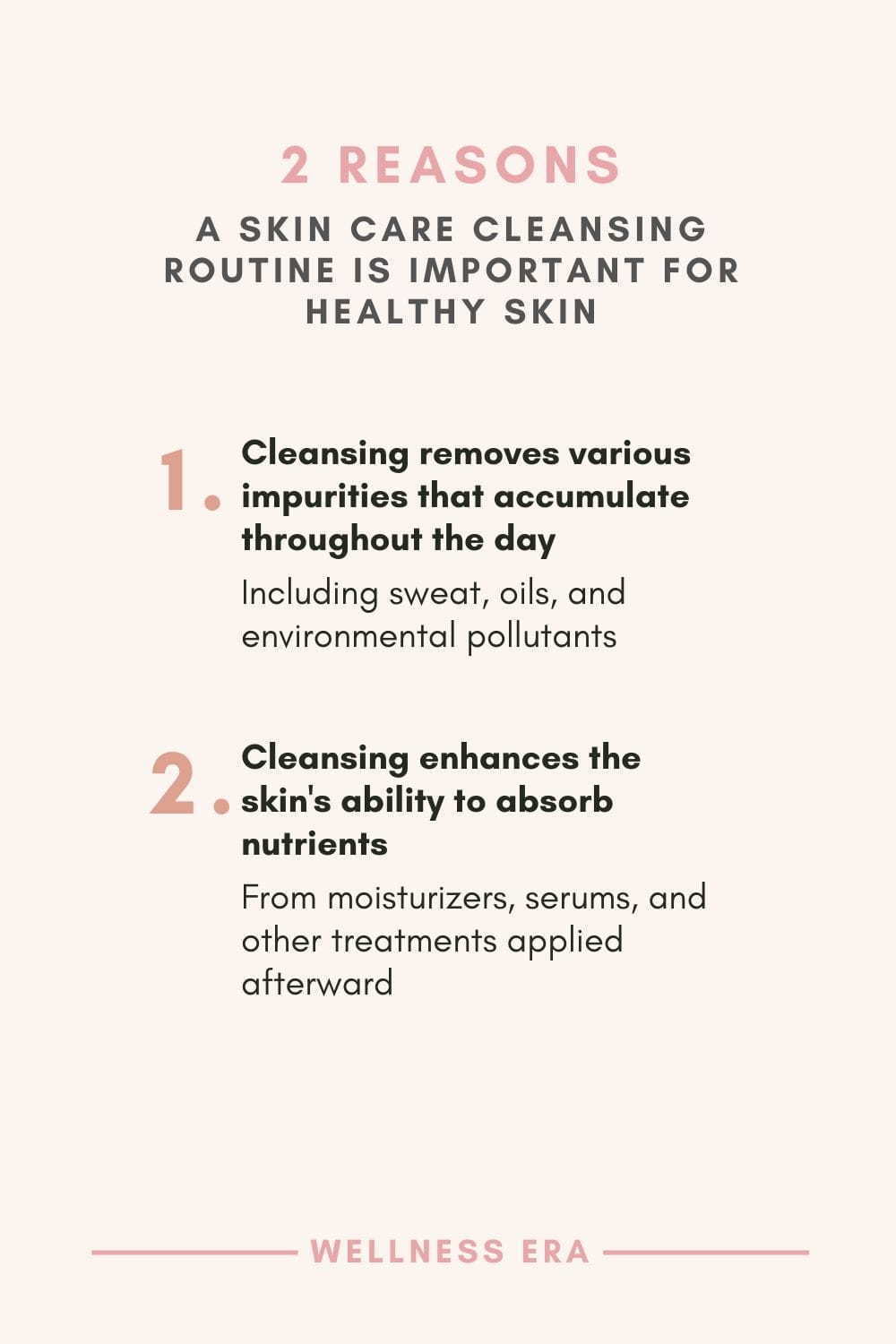
References
Mukhopadhyay, P. (2011). Cleansers and their role in various dermatological disorders. Indian Journal of Dermatology, 56(1), 2–6. https://www.ncbi.nlm.nih.gov/pmc/articles/PMC3088928/
Westlake Dermatology. (2013). Skin Cleansing 101: Why Washing Your Face is Important. https://www.westlakedermatology.com/blog/skin-cleansing-101-why-washing-your-face-is-important/
Eden Medical Clinic. (2022). Cleanser in Your Skincare Routine: Benefits, Side Effects, & Types. https://eden-medicalclinic.com/cleansers/
2. Understanding Common Skin Impurities
Every day, our skin comes into contact with a variety of impurities that can affect its health and appearance. Understanding these common impurities helps in choosing the most effective cleansing routine. The main types of impurities include environmental pollutants, sebum, sweat, makeup residue, and dead skin cells. These substances can combine on the skin’s surface, leading to clogged pores, irritation, and potential breakouts.
Environmental Pollutants: Airborne particles such as dust and smoke can settle on the skin, leading to oxidative stress and potentially contributing to skin disorders like acne and eczema. (Araviiskaia E., 2019). Small particles from the air can settle on the skin, leading to free radical damage and premature aging if not properly removed
Sebum and Sweat: While natural body oils (sebum) and sweat play essential roles in skin hydration and temperature regulation, they can also trap dirt and bacteria, contributing to clogged pores.
Makeup and Sunscreen Residue: Without thorough cleansing, makeup and sunscreen can leave residues that clog pores and reduce the effectiveness of other skincare products.
Dead Skin Cells: Naturally, our skin sheds dead cells, but these cells can accumulate if not properly removed, leading to dull and rough-looking skin.
By addressing these impurities with an effective cleansing routine, individuals can maintain a clear, smooth, and radiant complexion, reducing the risk of common skin issues.
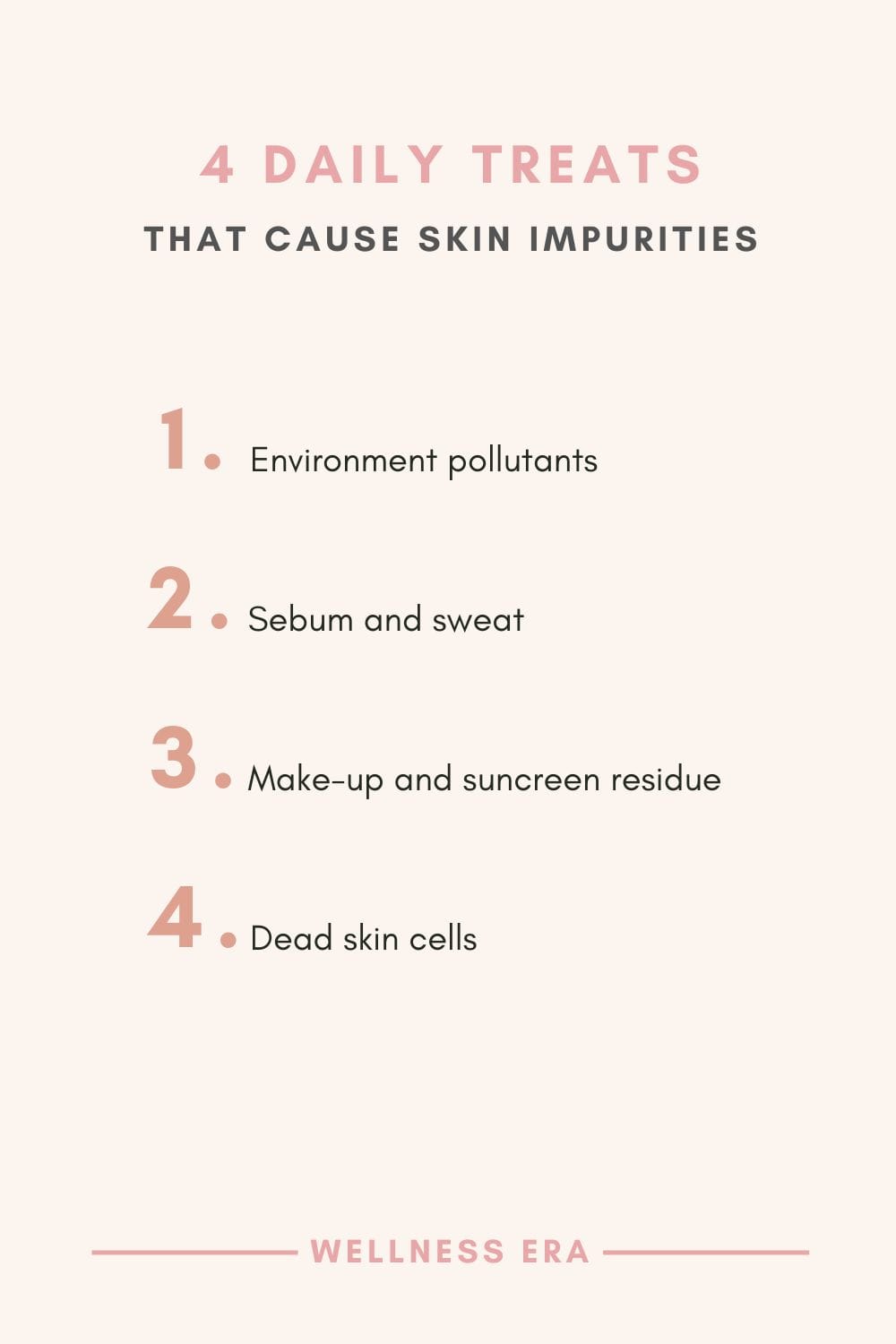

References
Roberts, W.E. (2021). Air pollution and skin disorders. International Journal of Women's Dermatology, 7(1), 91–97. https://www.sciencedirect.com/science/article/pii/S2352647520301623?via%3Dihub
3. Why Choose Natural Cleansers Over Chemical Options?
Switching to natural cleansers isn’t just a trend—it’s a smart choice for healthier skin and a healthier planet. Many commercial cleansers contain harsh surfactants like sulfates and synthetic preservatives such as parabens, which can disrupt the skin’s lipid barrier, alter its natural pH, and lead to irritation or dryness (Ananthapadmanabhan et al., 2004). Natural cleansers, on the other hand, are often much gentler, helping to maintain hydration and protect the skin’s natural defenses (Draelos, 2018).
Nourishing Ingredients for Healthier Skin
Natural cleansing agents like aloe vera, honey, and chamomile do more than just remove dirt—they soothe, hydrate, and nourish the skin. These botanical ingredients are packed with bioactive compounds that provide anti-inflammatory, antimicrobial, and antioxidant benefits, helping to cleanse without stripping away essential oils. They also support wound healing and calm irritation, making them ideal for sensitive or acne-prone skin (Hashemi et al., 2015). Plus, many plant-based cleansers are loaded with polyphenols, flavonoids, and vitamins, which help neutralize free radicals, promote skin repair, and may even slow signs of premature aging (Lin et al., 2017).
A More Eco-Friendly Choice
Beyond skincare benefits, natural cleansers are also better for the environment. Many conventional cleansers contain synthetic surfactants and microplastics that contribute to water pollution and bioaccumulation in aquatic ecosystems. Plant-based alternatives, however, are typically biodegradable, breaking down naturally without harming the environment (Monteiro-Riviere et al., 2011).
Choosing natural cleansers means treating your skin with kindness while making a sustainable choice for the planet.
Are you just starting to explore how to use Natural Skin Care in your routine? To understand what you put on your skin, the benefits of choosing natural and why natural ingredients matters, read the Complete Guide to Natural Skin Care for Beginners - and take the first step towards healthier skin today
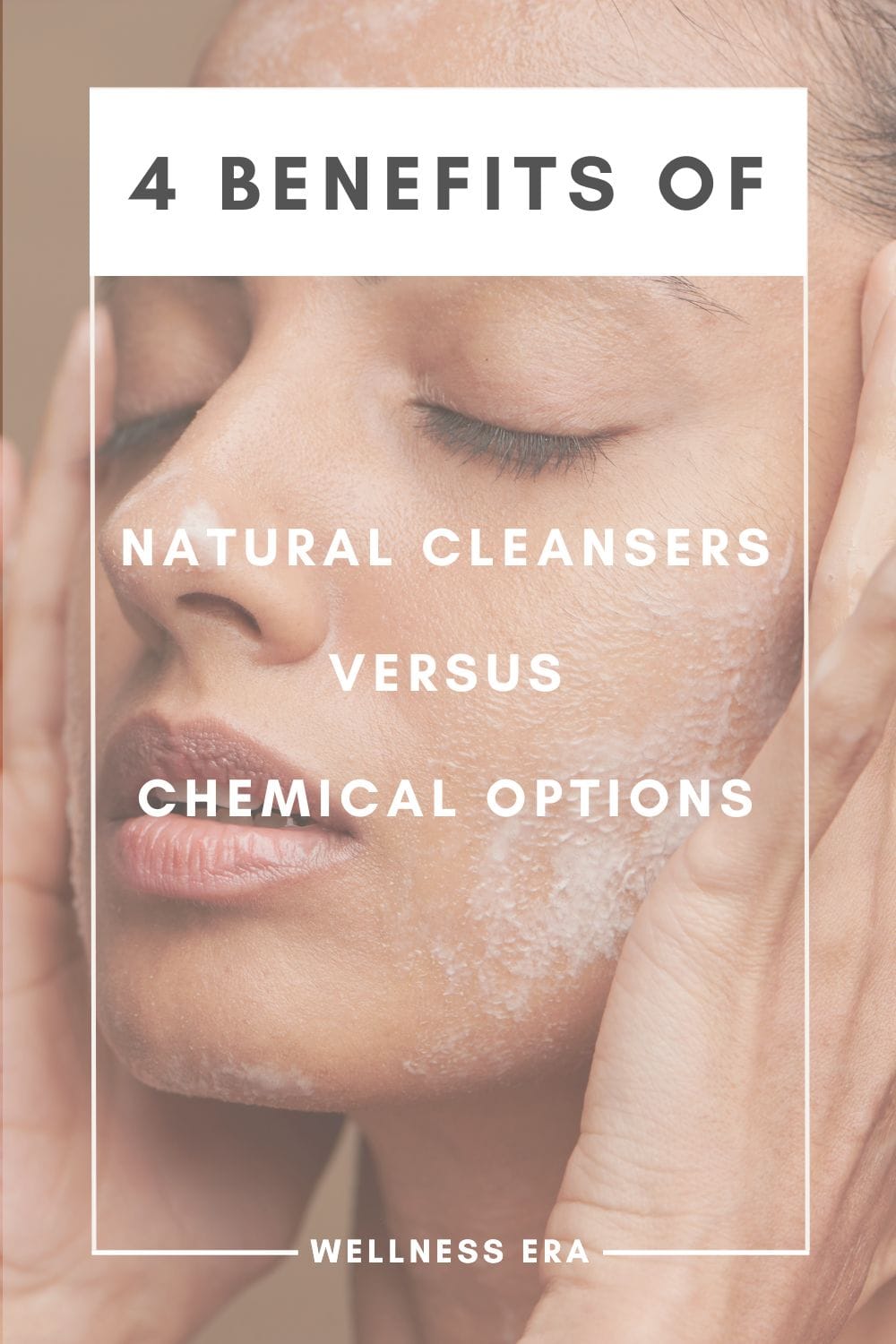
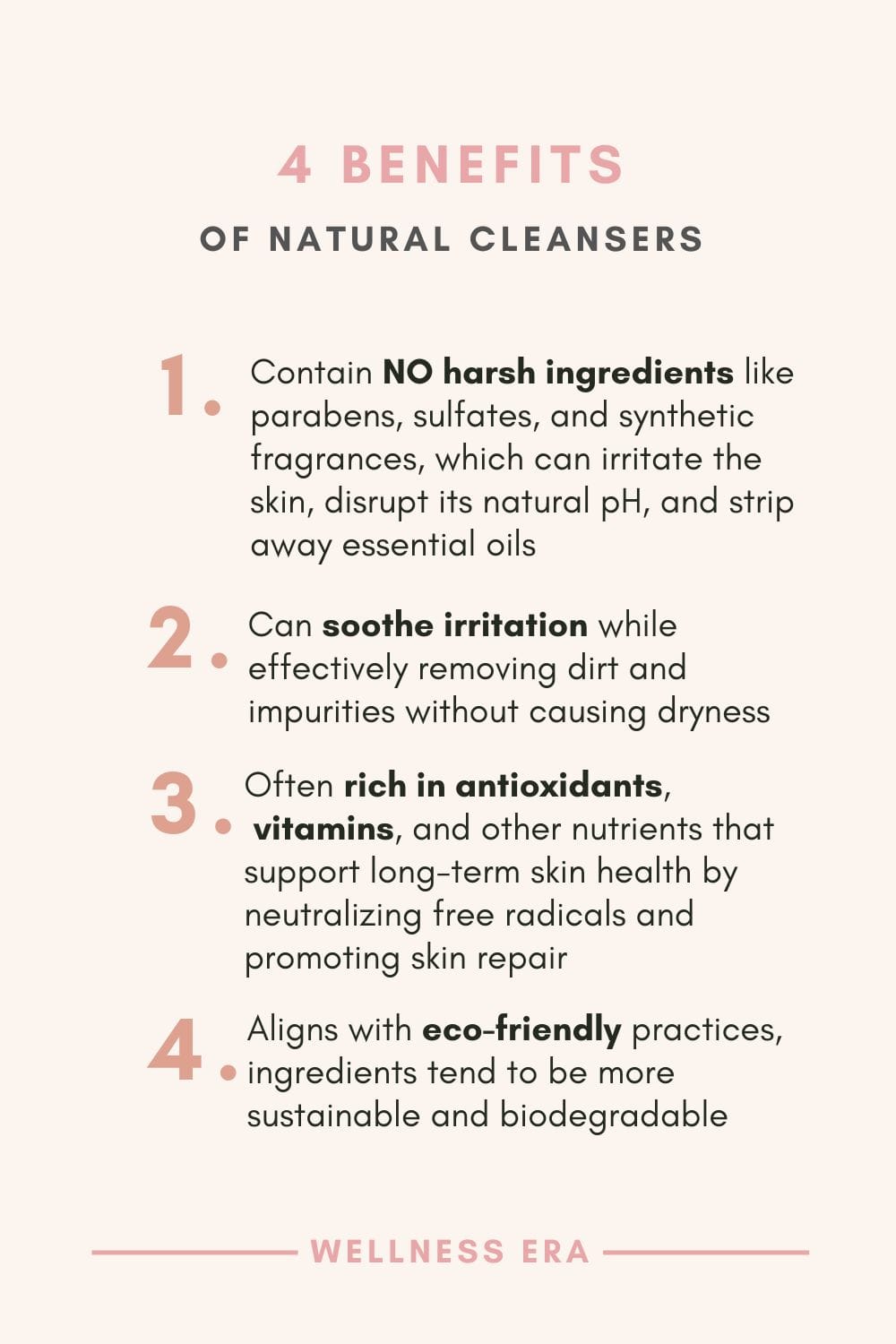
References
Ananthapadmanabhan, K.P., Moore, D.J., Subramanyan, K., Misra, M. and Meyer, F. (2004) ‘Cleansing without compromise: the impact of cleansers on the skin barrier and the role of moisturizing ingredients’, Dermatologic Therapy, 17(s1), pp. 16–25. URL: https://pubmed.ncbi.nlm.nih.gov/14728695/
Draelos, Z.D. (2018) ‘Cosmetic dermatology: products and procedures’, Journal of Clinical and Aesthetic Dermatology, 11(1), pp. 33–39.
Hashemi, S.A., Madani, S.A. and Abediankenari, S. (2015) ‘The review on properties of aloe vera in healing of cutaneous wounds’, BioMed Research International, 2015, pp. 1–6. URL: https://www.researchgate.net/publication/298527226_Cosmetic_Dermatology_Products_and_Procedures
Lin, T.K., Zhong, L. and Santiago, J.L. (2017) ‘Anti-inflammatory and skin barrier repair effects of topical application of some plant oils’, International Journal of Molecular Sciences, 19(1), pp. 70–82. URL: https://pmc.ncbi.nlm.nih.gov/articles/PMC5796020/
Monteiro-Riviere, N.A., Wiench, K., Landsiedel, R., Schulte, S., Inman, A.O. and Riviere, J.E. (2011) ‘Safety evaluation of sunscreen formulations containing titanium dioxide and zinc oxide nanoparticles in UVB sunburned skin: an in vitro and in vivo study’, Toxicological Sciences, 123(1), pp. 264–280. URL: https://academic.oup.com/toxsci/article-abstract/123/1/264/1644613?redirectedFrom=fulltext
4. Top Natural Cleansing Ingredients (that are not Food Ingredients)
If the thought of rubbing food on your face doesn’t exactly thrill you, you’re not alone! While some people swear by pantry staples like honey or yogurt, others might feel hesitant to smear breakfast on their skin. The good news? Natural skin cleansing goes far beyond what’s in your fridge! Plenty of plant-based, non-food ingredients offer effective cleansing power while being gentle on the skin.
Natural cleansing ingredients that don’t resemble a meal can be found in many forms, from gentle soap bars to clay powders and hydrosols. Here are some fantastic options that cater to different skin needs:
Natural Soap Bars: Made from natural oils like olive oil or coconut oil, these soaps cleanse the skin without drying it out. Popular types include Castile soap, a mild, versatile option, and Aleppo soap, known for its purifying and antimicrobial properties due to its laurel oil content. These soaps help remove impurities while preserving the skin’s moisture balance (Al-Mustafa and Al-Thunibat, 2008).
Clays: For those with oily or combination skin, clay can be an excellent cleanser. Bentonite clay is highly absorbent and can remove excess sebum and toxins from the skin, making it beneficial for acne-prone skin (Carretero, 2002). Meanwhile, kaolin clay is a gentler alternative, suitable for sensitive skin, as it does not overly strip moisture while still providing mild exfoliation and oil absorption (Fowler, 2019).
Hydrosols (Floral Waters): Hydrosols such as rose water, witch hazel, and lavender water offer refreshing cleansing benefits. Rose water is rich in antioxidants and has hydrating and anti-inflammatory properties, making it beneficial for dry and sensitive skin (Mahboubi, M. et. al, 2024). Witch hazel acts as a natural astringent, reducing excess oil and helping with acne due to its tannin content (Fechine, C.O.C., 2023). Lavender hydrosol provides antimicrobial and calming effects, making it ideal for irritated or inflamed skin (Koulivand, 2013).
These non-food, natural options provide all the benefits of cleansing while keeping your skincare routine fresh, effective, and free from unnecessary additives.
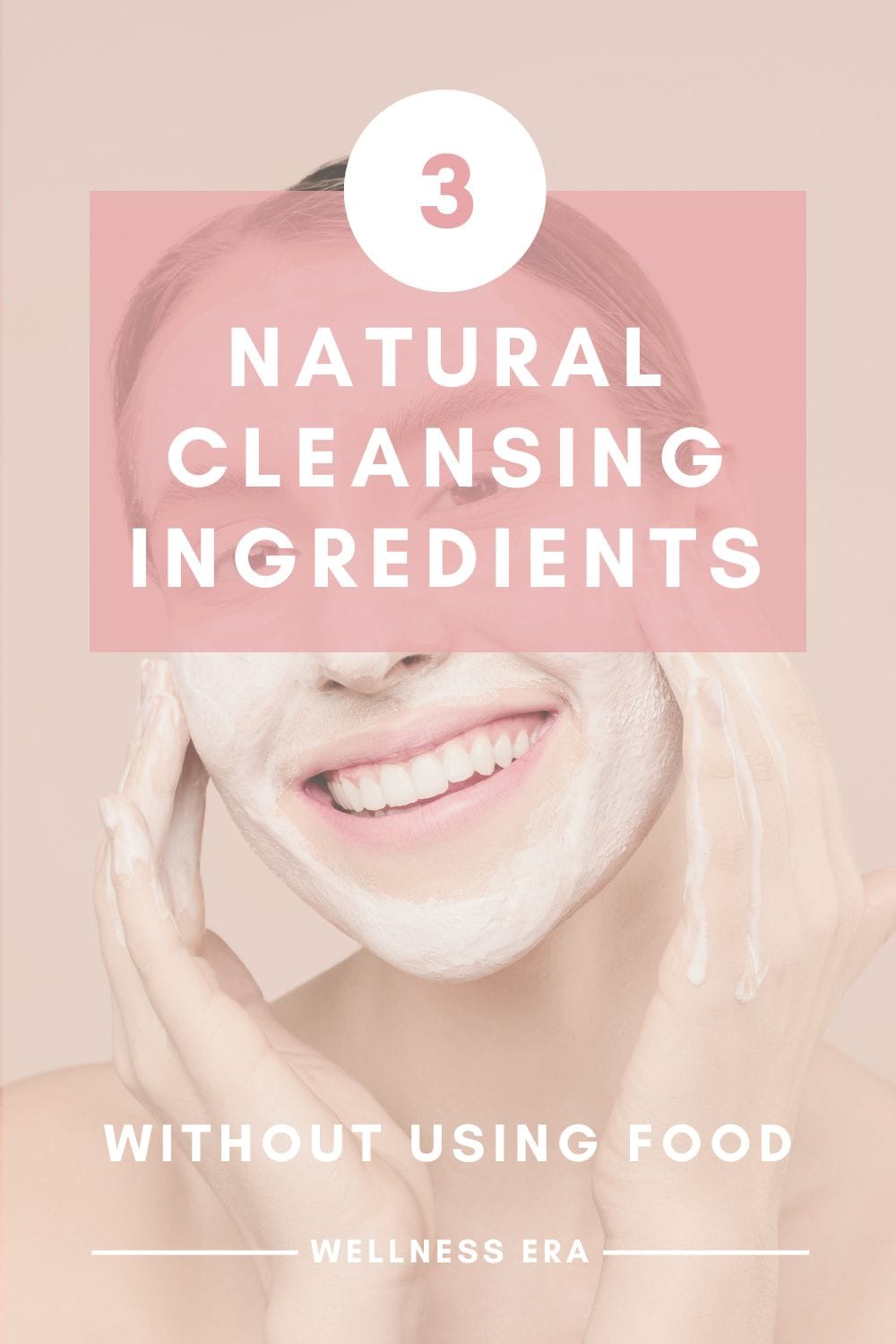
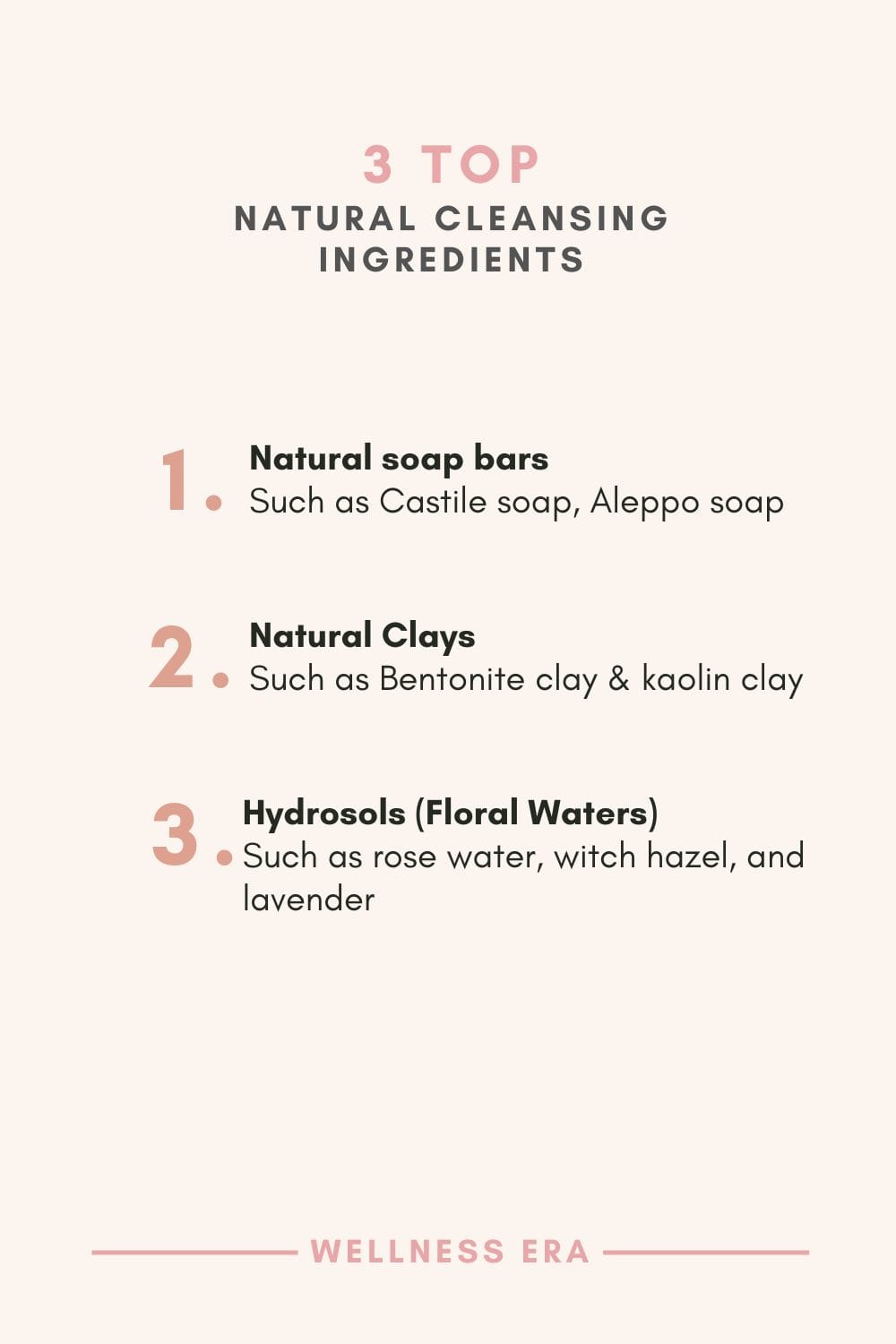
References
Al-Mustafa, A.H. and Al-Thunibat, O.Y. (2008) 'Antioxidant activity of some Jordanian medicinal plants used traditionally for treatment of diabetes', Pakistan Journal of Biological Sciences, 11(3), pp. 351-358. Available at: https://pubmed.ncbi.nlm.nih.gov/18817155/
Fechine, C.O.C., Souza, E.N., Anzai, A., and Fechine, C. (2023) ‘Sensitive scalp and trichodynia: Epidemiology, etiopathogenesis, diagnosis, and management’, Skin Appendage Disorders, 9(6), pp. 407-417. Available at: https://karger.com/sad/article/9/6/407/862911
Carretero, M.I. (2002) 'Clay minerals and their beneficial effects upon human health: a review', Applied Clay Science, 21(3), pp. 155-163. Available at: https://www.sciencedirect.com/science/article/abs/pii/S0169131701000850
Fowler, J.F. (2019) 'Kaolin clay in dermatology: absorptive and soothing properties', Journal of Drugs in Dermatology, 18(1), pp. 80-85. Available at: https://jddonline.com/articles/kaolin-clay-in-dermatology-absorptive-and-soothing-properties-S1545961619P0080X
Mahboubi, M. and Lu, S.H. (2024) ‘Rose water, quality control, and its application’, Journal of Medicinal Plants, 23(2), pp. 115-130. Available at: http://jmp.ir/article-1-3697-en.html (Accessed: 19 February 2025).
Koulivand, P.H., Ghadiri, M. and Gorji, A. (2013) 'Lavender and the nervous system', Evidence-Based Complementary and Alternative Medicine, 2013, pp. 1-10. Available at: https://pubmed.ncbi.nlm.nih.gov/23573142/
5. How to Choose Natural Cleansers Based on Skin Type
Choosing the right natural cleanser for your skin type doesn’t have to be complicated. Each skin type—whether oily, dry, sensitive, or a mix—benefits from different natural properties. Instead of focusing on specific products, understanding the right ingredients helps you select a cleanser that works with your skin, not against it.
Oily or Acne-Prone Skin:
Oily and acne-prone skin benefits from clay-based cleansers, which help absorb excess oil and purify the skin. Bentonite and kaolin clays have been found to remove excess sebum while maintaining skin barrier integrity (Draelos, 2018). Hydrosols like tea tree and witch hazel provide antibacterial and anti-inflammatory effects, reducing acne severity and controlling oil production (Shenefelt, 2012)
Dry or Mature Skin:
For skin that needs hydration, gentle, moisturizing cleansers are ideal. Castile soap, made from olive oil, is mild and helps maintain the skin’s moisture barrier (Li, 2020). Ingredients like rose water and aloe vera provide hydration without causing dryness. Rose water has antioxidant and anti-inflammatory properties, making it suitable for aging or dry skin (Mahboubi and Lu, 2024).
Sensitive Skin:
Sensitive skin benefits from soothing, non-irritating ingredients. Kaolin clay is a mild cleanser that gently removes impurities while keeping skin hydrated (Sarruf et. al, 2024). Hydrosols like chamomile and lavender help reduce redness and irritation, offering calming and antimicrobial benefits (Koulivand, et. al, 2013).
The beauty of natural cleansing is its adaptability—you can choose ingredients that truly suit your skin, allowing you to create a skincare routine that’s both gentle and effective. Click on the next link to explore the Top 5 Natural Cleansers for Glowing Skin!
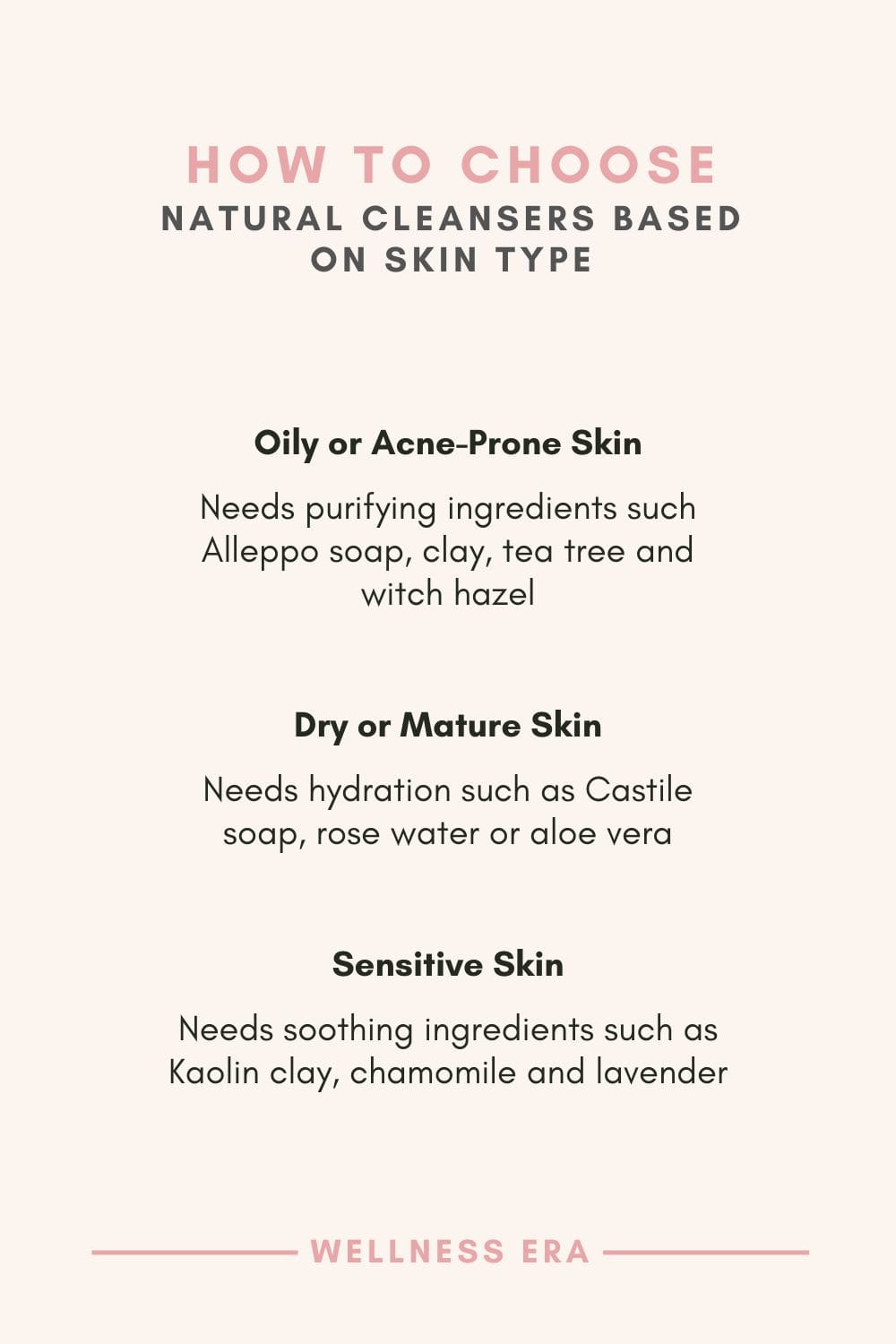

References
Draelos, Z.D. (2018) ‘The science behind skin care: Cleansers’, Journal of Cosmetic Dermatology, 17(1), pp. 12–18. Available at: https://onlinelibrary.wiley.com/doi/abs/10.1111/jocd.12469
Koulivand, P.H., Ghadiri, M., and Gorji, A. (2013) ‘Lavender and the nervous system’, Evidence-Based Complementary and Alternative Medicine, 2013, pp. 1–10. Available at: https://pubmed.ncbi.nlm.nih.gov/23573142/
Li, Z. (2020) ‘Modern mild skin cleansing’, Journal of Cosmetics, Dermatological Sciences and Applications, 10(1), pp. 50–62. Available at: https://www.scirp.org/journal/paperinformation?paperid=100876
Mahboubi, M. and Lu, S.H. (2024) ‘Rose water, quality control, and its application’, Journal of Medicinal Plants, 23(2), pp. 115-130. Available at: https://jmp.ir/article-1-3697-en.html
Sarruf, F.D., Contreras, V.J.P., Martinez, R.M., Velasco, M.V.R., and Baby, A.R. (2024) ‘The scenario of clays and clay minerals use in cosmetics/dermocosmetics’, Cosmetics, 11(1), p.7. Available at: https://www.mdpi.com/2079-9284/11/1/7
Shenefelt, P.D. (2012) ‘Herbal treatment for dermatologic disorders’, Integrative Medicine, pp. 629-648. Available at: https://www.ncbi.nlm.nih.gov/books/NBK92761/
6. Comparing Water-Only Cleansing vs. Cleansing with Ingredients
Some might wonder if cleansing with just water is enough to maintain healthy skin. After all, water is gentle and doesn’t disturb the skin’s natural oils. While water-only cleansing can be useful for a quick refresh, it often falls short when it comes to deeply removing the buildup of oils, makeup, and environmental impurities.
Water alone cannot break down oil-based debris, such as sebum, sunscreen, and pollutants, which can accumulate on the skin (Draelos, 2018). Sebum, in particular, is hydrophobic, meaning it does not dissolve in water, necessitating the use of ingredients with surfactant or absorbent properties for effective cleansing (Draelos and Thaman, 2006).
Using natural ingredients like clay, soap bars, or hydrosols can provide a deeper cleanse than water alone. Clays, such as bentonite or kaolin, have been scientifically shown to absorb excess oil and draw out impurities from pores, making them effective at preventing breakouts and congestion (Carretero, 2002). Hydrosols, such as rose water or witch hazel, offer mild astringent properties and soothing effects that water alone does not provide (Shenefelt, 2012).
Additionally, natural cleansers provide skin-nourishing benefits that water simply cannot. Many contain vitamins, antioxidants, and minerals that help maintain a healthy skin barrier, combat inflammation, and improve skin texture (Lin et al., 2017). This makes ingredient-based cleansing superior to water-only cleansing when it comes to overall skin health.
For those looking for a clean, healthy glow, the extra benefits of ingredient-based cleansing far outweigh the simplicity of washing with just water.
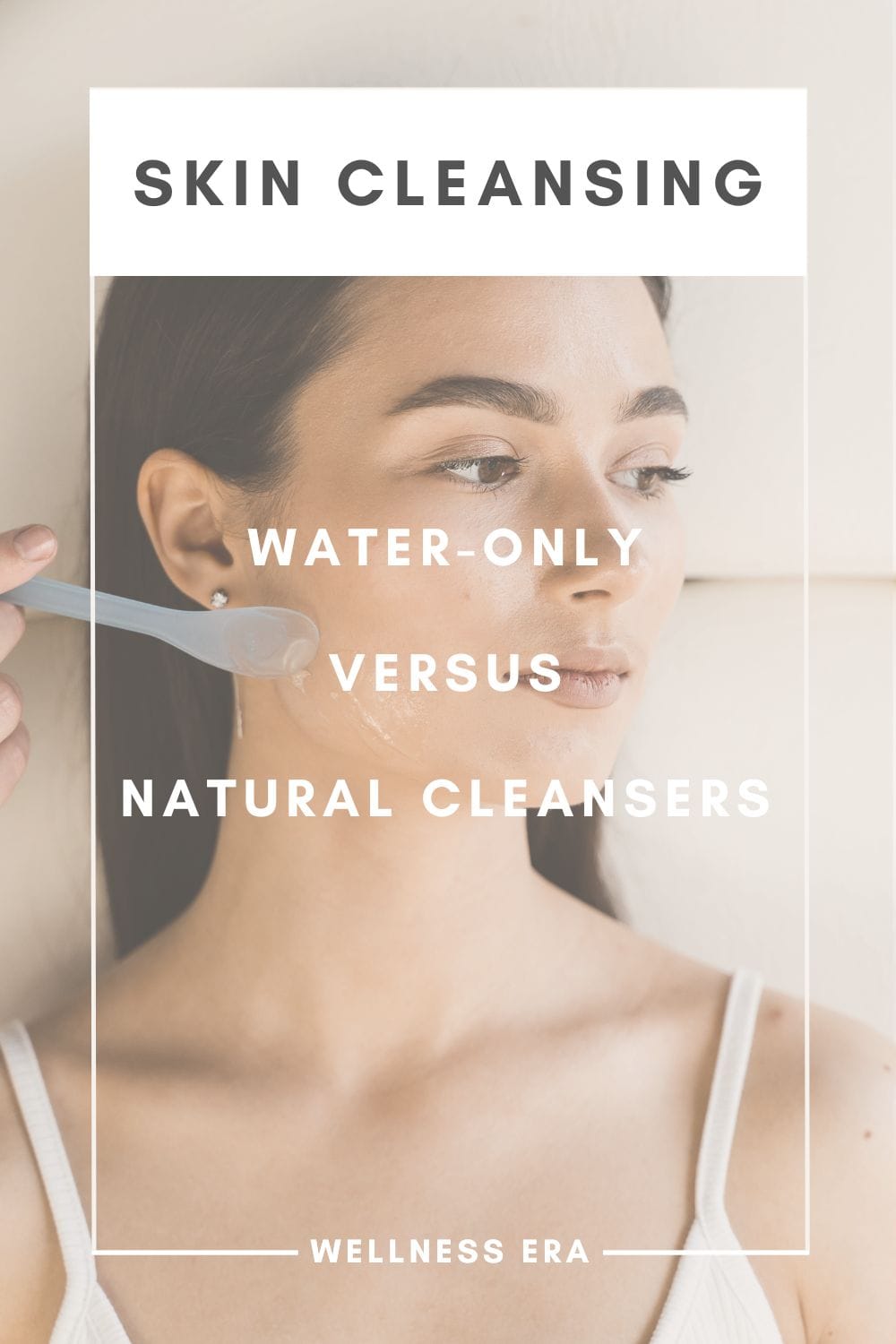
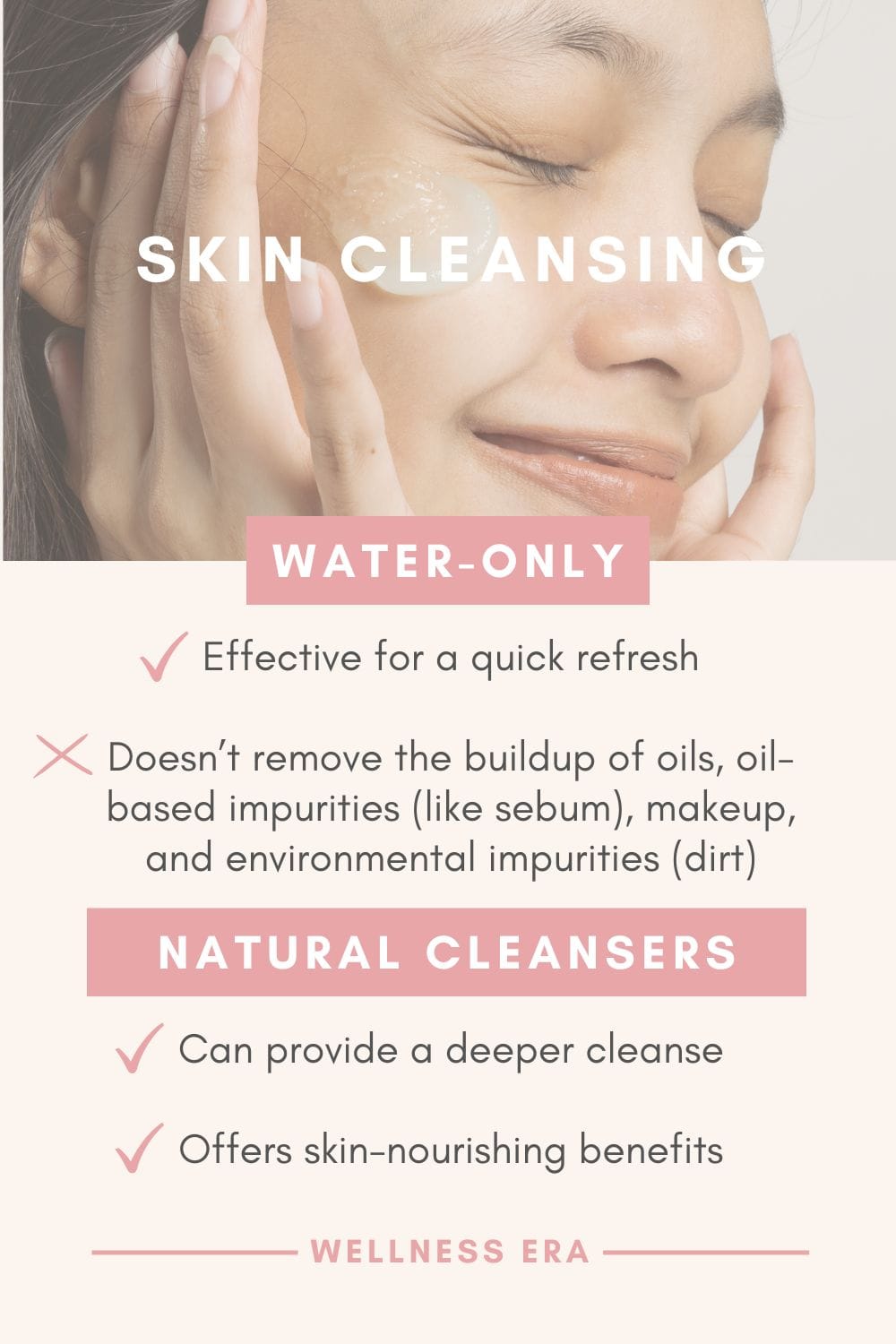
References
Carretero, M.I. (2002) ‘Clay minerals and their beneficial effects upon human health: A review’, Applied Clay Science, 21(3), pp. 155-163. Available at: https://www.sciencedirect.com/science/article/pii/S0169131701000850
Draelos, Z.D. (2018) ‘The science behind skin care: Cleansers’, Journal of Cosmetic Dermatology, 17(1), pp. 12–18. Available at: https://onlinelibrary.wiley.com/doi/abs/10.1111/jocd.12469
Draelos, Z.D. and Thaman, L.A. (2006) Cosmetic formulation of skin care products. Boca Raton: CRC Press.
Lin, T.K., Zhong, L. and Santiago, J.L. (2017) ‘Anti-inflammatory and skin barrier repair effects of topical application of some plant oils’, International Journal of Molecular Sciences, 19(1), p. 70. Available at: https://www.mdpi.com/1422-0067/19/1/70
Shenefelt, P.D. (2012) ‘Herbal treatment for dermatologic disorders’, Integrative Medicine, pp. 629-648. Available at: https://europepmc.org/books/nbk92761
7. Non-Food-Based Natural Cleansing for Those with Sensitivities
Not everyone is comfortable with food-based products in their skincare routine, and that’s completely fine! Natural cleansing doesn’t have to involve food items like yogurt or honey to be effective. Fortunately, there are plenty of powerful, non-food-based options that cleanse and soothe the skin.
For those with sensitive skin, gentle, plant-based ingredients offer effective cleansing without irritation. Floral waters (hydrosols), such as rose water and chamomile hydrosol, are excellent non-food-based choices. Rose water is known for its anti-inflammatory and hydrating effects, making it ideal for sensitive and reactive skin (Kumar et al., 2019). Chamomile hydrosol has soothing and antimicrobial properties, which help reduce skin irritation and redness (Pérez-Sánchez et al., 2016).
Another excellent option for gentle cleansing is jojoba oil. Unlike many other oils, jojoba oil closely resembles human sebum, allowing it to cleanse without clogging pores or causing irritation. Research shows that jojoba oil helps regulate oil production, hydrate the skin, and support the skin barrier (Pazyar et al., 2013).
Additionally, aloe vera gel serves as a fantastic non-food-based cleanser. Known for its cooling and calming properties, aloe vera is rich in antioxidants and polysaccharides, which aid in skin hydration and repair. Studies confirm its anti-inflammatory, antibacterial, and wound-healing properties, making it suitable for nearly every skin type (Surjushe, Vasani, and Saple, 2008).
These non-food alternatives ensure that anyone, regardless of sensitivities or personal preferences, can enjoy the benefits of a natural cleansing routine while avoiding common food-based skincare ingredients.
For anyone, but especially if you have sensitive skin, make sure that after cleansing, you balance your skin with a gentle moisturizer! Check out the Best Natural Moisturizers for Sensitive Skin.
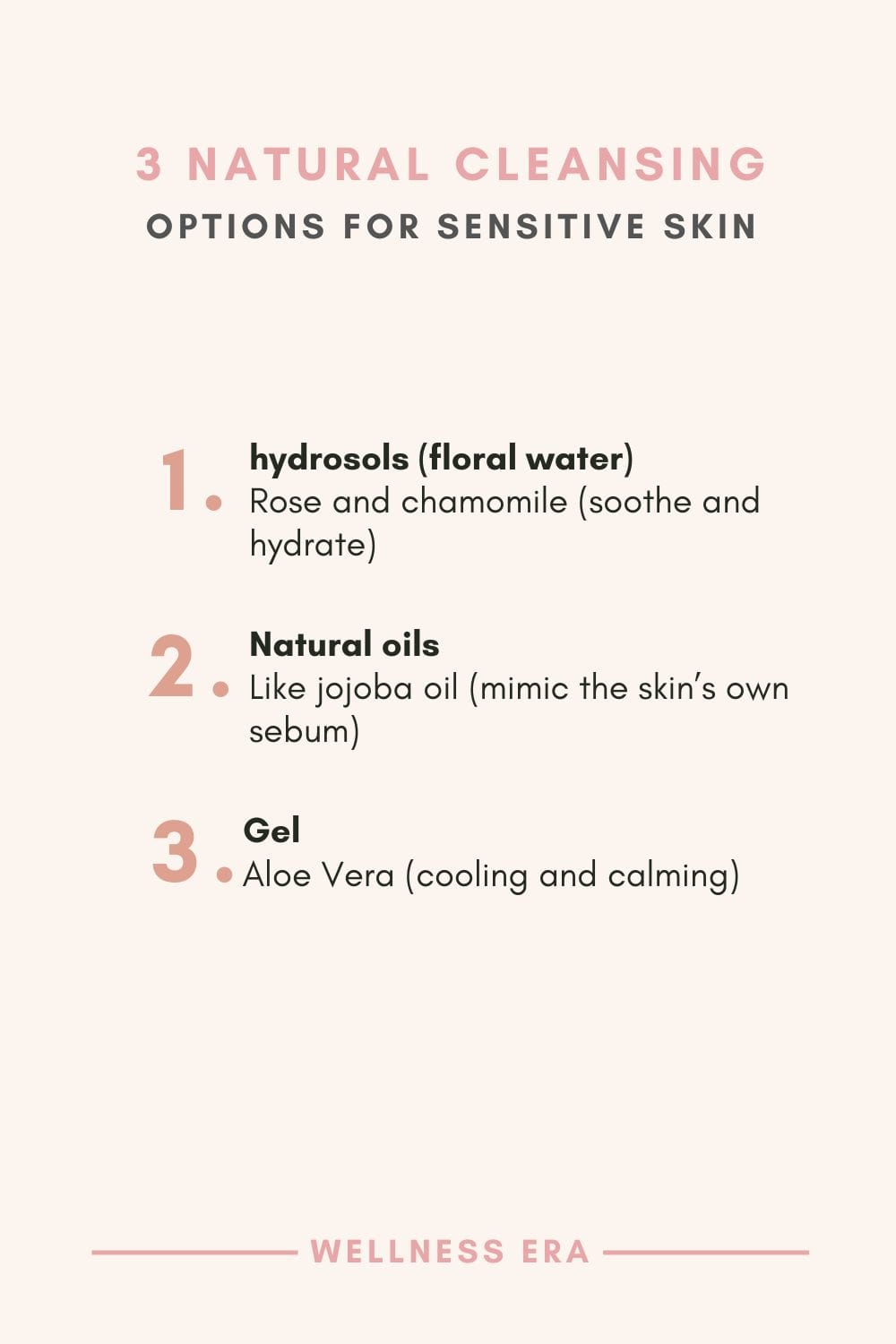
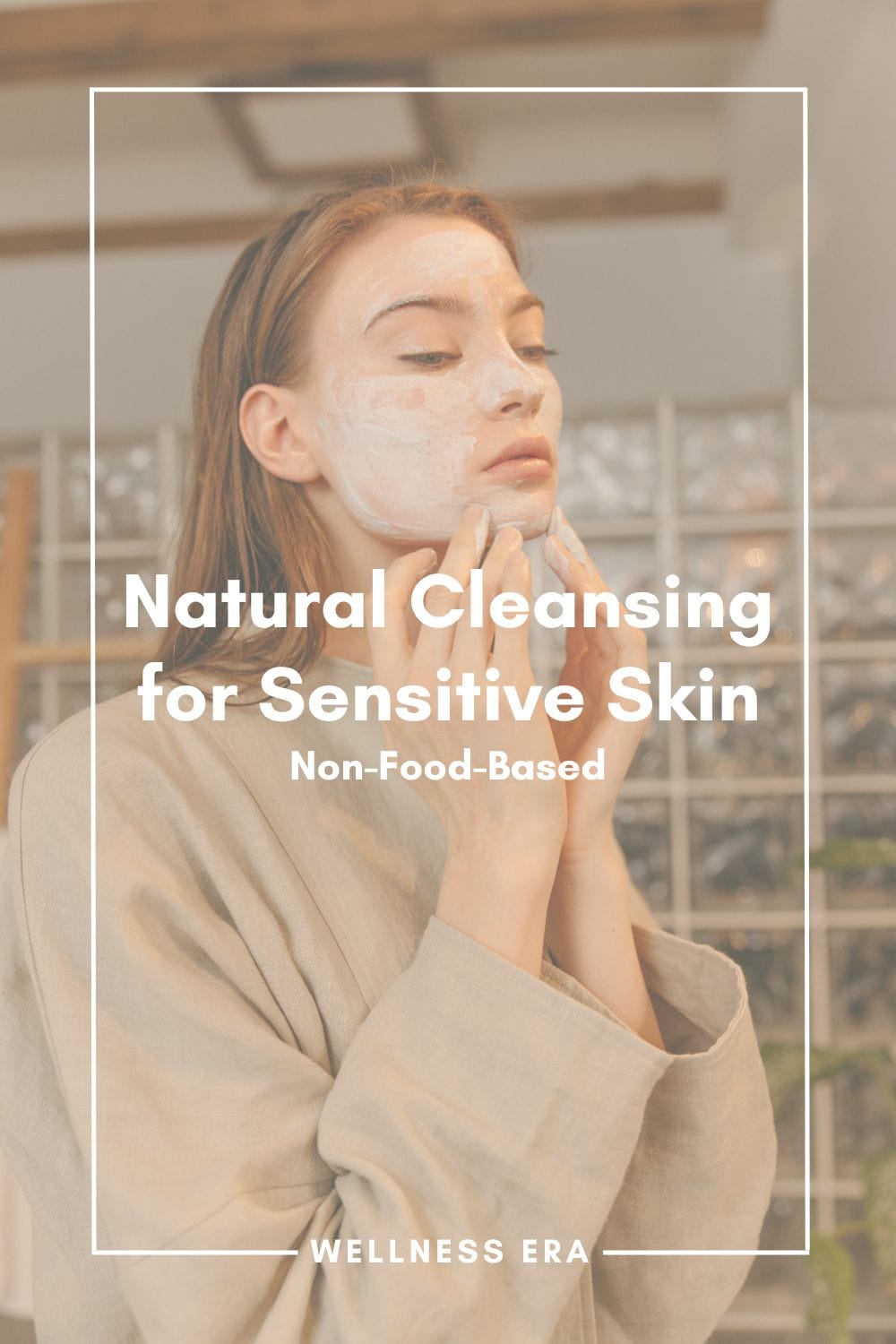
References
Kumar, N., Bhandari, P., Singh, B., and Bari, S.S. (2019) ‘Rose water: Chemistry, processing, and uses’, Phytotherapy Research, 33(10), pp. 2685-2700. Available at: https://onlinelibrary.wiley.com/doi/full/10.1002/ptr.6476
Pérez-Sánchez, A., Barrajon-Catalan, E., Herranz-Lopez, M., Micol, V. (2016) ‘Protective effects of polyphenols against skin aging’, Oxidative Medicine and Cellular Longevity, 2016, pp. 1-16. Available at: https://www.hindawi.com/journals/omcl/2016/1459047/
Pazyar, N., Yaghoobi, R., Ghassemi, M.R., Kazerouni, A. (2013) ‘Jojoba in dermatology: A succinct review’, Giornale Italiano di Dermatologia e Venereologia, 148(6), pp. 687-691. Available at: https://pubmed.ncbi.nlm.nih.gov/24335613/
Surjushe, A., Vasani, R., Saple, D.G. (2008) ‘Aloe vera: A short review’, Indian Journal of Dermatology, 53(4), pp. 163-166. Available at: https://www.ncbi.nlm.nih.gov/pmc/articles/PMC2763764/
8. How to Incorporate Natural Cleansers into a Routine
Creating a natural cleansing routine doesn’t have to be complicated. In fact, it can be refreshingly simple, with just a few steps that adapt to your skin’s needs at different times of the day. Here’s a natural, balanced approach to cleansing:
Morning Routine: Begin your day with a light cleanse using rose water or a gentle oil cleanser, such as jojoba or grapeseed oil. These ingredients are mild yet effective, providing a gentle cleanse while leaving skin fresh and hydrated for the day ahead.
Evening Routine: In the evening, opt for a mild natural soap or oil to remove the buildup from the day. For those who prefer a water-based cleanser, a mild Castile soap works well to cleanse without over-drying the skin. Alternatively, an oil cleanser can dissolve impurities and makeup effectively, especially when followed by a warm, damp cloth to remove excess.
Weekly Rituals: Once or twice a week, give your skin an extra treat with gentle clays or mild scrub powders. Bentonite or kaolin clay masks draw out impurities from deep within the pores, and a fine powder scrub like rice or oat flour provides a gentle exfoliation to keep skin smooth and radiant.
This routine allows you to enjoy a natural, non-toxic skincare approach that’s effective and suitable for all skin types.

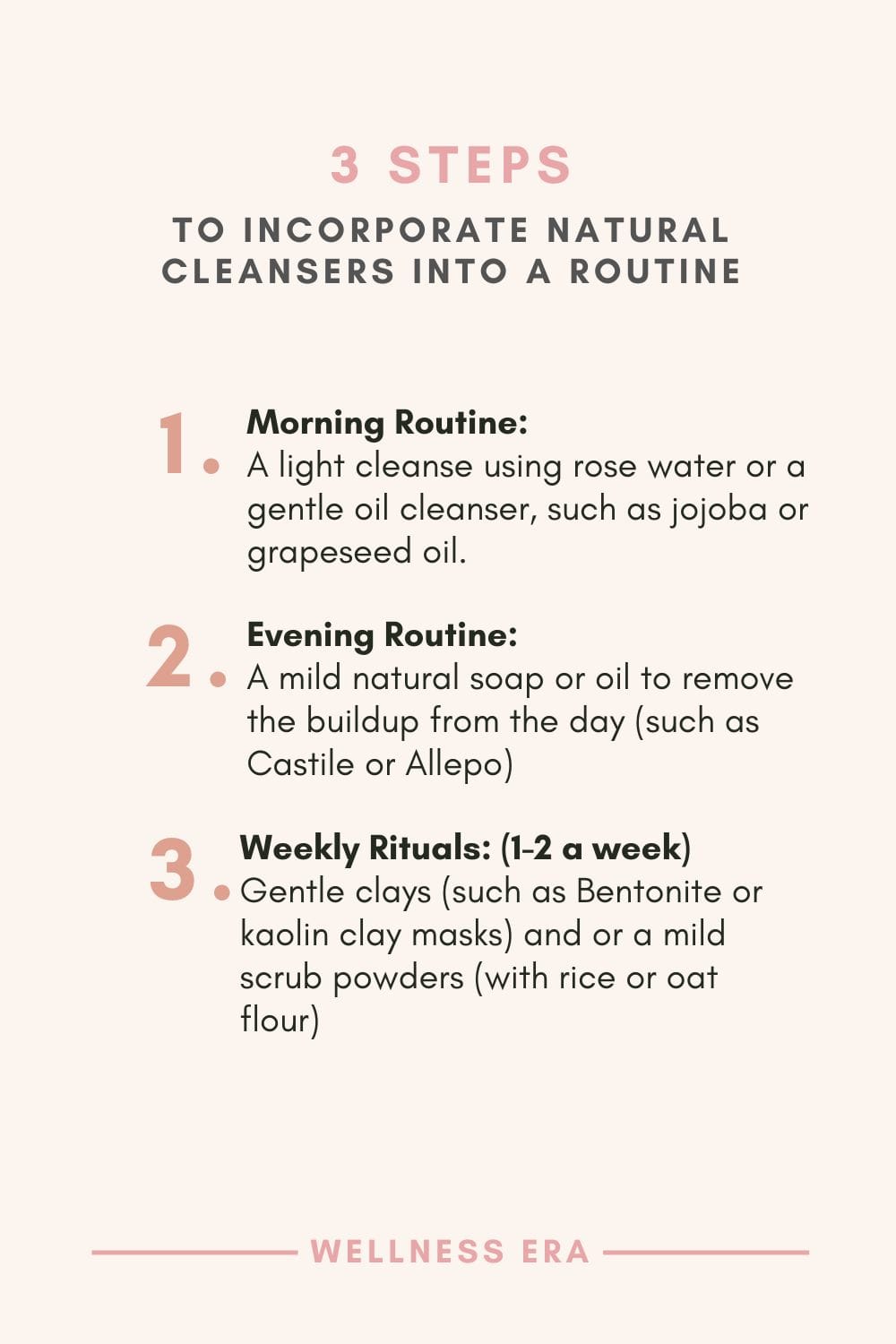
The Importance of Cleansing in Natural Skin Care
Incorporating natural cleansing into your skincare routine can be a transformative step towards healthier, balanced, and radiant skin. By using gentle, plant-based ingredients, you can cleanse without stripping away essential oils or disrupting the skin’s natural barrier. Whether you choose soap bars, hydrosols, or clays, these natural cleansers offer both cleansing power and nourishment, helping the skin stay resilient against environmental stressors and free radicals.
Natural cleansing isn’t just about avoiding chemicals; it’s about embracing a holistic approach to skin care that respects both your skin and the environment. As more people recognize the benefits of natural ingredients, we are seeing a shift toward mindful skincare practices that promote long-term health and wellness. So, if you’re ready to make the switch, start with ingredients that align with your skin type and enjoy the lasting benefits of a cleaner, greener routine.
Frequently Asked Questions (FAQs)
Is cleansing with water enough for sensitive skin?
For those with highly sensitive skin, cleansing with water in the morning can be beneficial, as it avoids the risk of over-cleansing. However, to remove oils, pollutants, and buildup from the day, it’s usually best to use a gentle, natural cleanser in the evening. Water alone often isn’t effective at removing oil-based impurities like sebum and makeup, so even for sensitive skin, a mild cleanser is typically recommended.
What’s the best natural cleanser for oily skin?
Oily skin often benefits from ingredients like clay and witch hazel, which help regulate oil production. Clays such as bentonite are particularly effective at absorbing excess oils without stripping the skin. A witch hazel hydrosol can also be a great option to reduce shine and keep pores clear.
How often should I use clay as a cleanser?
Clays are powerful detoxifiers but should generally be used no more than once or twice a week to avoid over-drying the skin. For those with very oily skin, using a clay mask or cleanser once a week is usually sufficient, while those with combination skin may find once every other week works best.
Can I make my own natural cleansers at home?
Absolutely! Many natural cleansers can be made with simple ingredients like rose water, diluted apple cider vinegar, or aloe vera gel. DIY options allow for complete control over ingredients and can be tailored to suit your skin’s unique needs.
Are natural cleansers better for long-term skin health?
Studies suggest that natural cleansers are gentler on the skin’s barrier and often contain beneficial compounds like antioxidants and vitamins that support skin health over time. By avoiding harsh chemicals, natural cleansers are generally a healthier choice for maintaining balanced, hydrated skin in the long run.
How can I avoid dryness when using natural cleansers?
To avoid dryness, choose ingredients that hydrate while cleansing. Oils like jojoba and rosehip are excellent choices for dry or combination skin, as they provide moisture and balance without clogging pores. Additionally, using a hydrating toner like rose water after cleansing can lock in moisture and prevent dryness.
What’s the ideal frequency for using clay masks or scrubs?
For most skin types, once or twice a week is enough to benefit from clay masks or gentle scrubs. Over-exfoliating can lead to irritation, especially if the skin is sensitive. Adjust based on how your skin reacts, and remember that sometimes, less is more.
Are natural cleansers safe for acne-prone skin?
Yes, many natural cleansers are effective for acne-prone skin. Look for antibacterial and anti-inflammatory ingredients like tea tree oil and aloe vera, which help to soothe and prevent breakouts. Avoid overly heavy oils or ingredients that may clog pores.
Can I switch between different natural cleansers?
Absolutely! In fact, alternating between a few natural cleansers, like using a clay mask weekly and a hydrosol daily, can provide the skin with a balanced routine. Just ensure you’re not overloading your skin and that the cleansers you choose complement each other.
How can I test if a natural cleanser suits my skin?
To check for compatibility, do a patch test by applying a small amount of the cleanser on your inner arm and waiting 24 hours to see if there’s a reaction. If your skin feels calm and shows no irritation, the cleanser is likely safe for your face.
Here is something you might also like..
Would you like to receive something special?
Try out the best, inspirational weekly newsletter for your natural wellness era!
My Wellness Era Weekly
SUBSCRIBE TO OUR NEWSLETTER
Your Weekly Dose of Natural Wellness
Fill out the form below, and you will reveice "My Wellness Era Weekly" delivered to your inbox.
What you can expect: a short, warm, and personal note from our founder. Mindset shifts, journal prompts, or self-care reminders. Inspiring quotea related to wellness, mindfulness, or self-love. Small, actionable wellness habits you can try. Recomendations we love, are testing, or recently discovered. Highlights of our latest blog posts.
+++ What we’re loving every single week.
QUICK LINKS
SOCIAL
CATEGORIES



